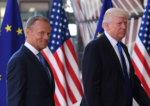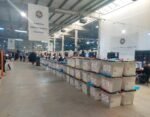South Korean authorities failed on Friday to arrest ousted President Yoon Suk Yeol after presidential security forces thwarted the attempt.
Officials from the Corruption Investigation Office (CIO) arrived at Yoon’s residence shortly after 7 a.m. local time, witnesses told Reuters, as reported by Hina.
Upon entering the premises, CIO agents and police were met by members of the Presidential Security Service (PSS) and soldiers, local media reported. South Korea’s Ministry of National Defense confirmed that these soldiers were under PSS control.
The CIO abandoned the attempt to arrest Yoon around 1:30 p.m. local time, citing concerns for the safety of their personnel. In a statement, the agency expressed “deep regret” over Yoon’s failure to comply with the arrest warrant.
“It was deemed practically impossible to execute the warrant due to the standoff,” the CIO stated.
Yoon’s attorney declared the warrant invalid and accused the CIO of acting unlawfully. The lawyer announced plans to pursue legal action, though no further details were provided. Meanwhile, Yoon’s legal team entered the presidential residence.
CIO officials also faced resistance from protesters supporting the ousted president outside the residence.
“We must block them with our lives,” one protester declared. Others shouted, “The president will be protected by the people,” while calling for the arrest of the CIO chief.
The current arrest warrant is valid until January 6, allowing investigators to detain Yoon for only 48 hours upon his arrest. During that time, they must decide whether to request his continued detention or release him.
Yoon stunned South Korea on December 3 by declaring a state of emergency to overcome political deadlock and root out “anti-state forces.” Hours later, 190 lawmakers voted against his decree.
Yoon subsequently revoked the state of emergency, accusing domestic political opponents of being aligned with North Korea.







